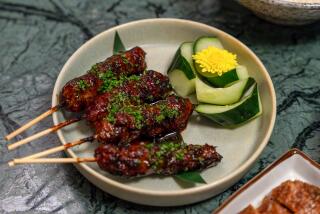Gleaming Singapore Enforces Tough Laws : Southeast Asia: Pristine city-state of antiseptic high-rises, marble shopping malls and hard-driving executives is widely known for its harsh punishments.
- Share via
SINGAPORE — Just the name “Singapore” once evoked images of a steamy, malaria-infested port filled with opium dens, bawdyhouses and starchy British colonials sipping gin and tonic in the shade of the Cricket Club.
Today, this pristine city-state of antiseptic high-rises, marble shopping malls and hard-driving executives is widely known for its tough laws and even harsher punishments.
Singaporeans, who have grown accustomed to eating burgers at the Hard Rock Cafe and shopping at such European emporiums as Gucci and Chanel, say the authoritarian rule, bordering on social engineering, has brought order and prosperity.
The country’s nearly 3 million citizens, of Chinese, Malay and Indian descent, are a model of harmony in a region where these ethnic groups often have clashed in bloody conflict.
Singapore has laws banning everything from chewing gum to unflushed public toilets. The latest target of Singapore’s penchant for restrictive lawmaking is the foul-smelling durian fruit, now illegal on subways and buses and in other public places.
Remote-control cameras photograph speeders, red-light runners and forgetful flushers. The lawbreakers sometimes find their pictures prominently displayed in the unanimously pro-government newspapers.
Along with public humiliation come stiff fines--$100 for failing to flush, about $700 for littering one of Singapore’s immaculate, flower-trimmed boulevards.
Those who cannot pay spend a Sunday picking up trash, under police escort, in the gracious parks that give Singapore an air of civility that contrasts starkly with the disorder and environmental degradation of other Southeast Asian capitals.
Although these laws might seem trivial to most of the 6.4 million tourists who visited Singapore in 1994, other laws are anything but. Immigration forms handed out on arriving airliners warn that drug traffickers face an automatic death penalty.
As Ohio teen-ager Michael Fay learned last year, even the President of the United States has little influence over Singapore’s prickly bureaucracy and Draconian judiciary. For spray-painting cars, Fay received a whipping with a rattan cane despite a clemency plea from Bill Clinton, the chief executive of Singapore’s largest trading partner.
“This is a country where crime really is against the law,” goes an often-repeated refrain on this Chicago-size, 225-square-mile island on the southern tip of the Malay Peninsula.
Only a generation ago, visitors are reminded, Singapore was an impoverished British colonial backwater threatened by Communist terrorism and torn by ethnic strife.
Since breaking away from a short-lived federation with Malaysia in 1965, Singapore has become one of the wealthiest places on Earth, with a living standard second only to Japan’s in Asia.
Mention the country’s strict legal code, and Singaporeans--especially the Chinese majority--generally see the velvet hand of a Confucian father, not the iron fist of an authoritarian Big Brother.
The country’s politicians frequently paint Singapore as a role model for China, Vietnam and other rapidly industrializing countries of the region, asserting that restraints on individual freedom are sometimes necessary for economic success.
Singapore’s outspoken permanent secretary of foreign affairs, Kishore Mahbubani, touched off a controversy earlier this year with claims that distinctly Asian values--a Confucian system that puts the good of the larger society ahead of the individual--contribute to economic growth and political stability and deter wars.
Western critics argue that Asia has as many unsettled borders, ethnic tensions, and political upheavals as Eastern Europe and the former Soviet Union.
While expressing admiration for the success of the “Singapore system” in creating wealth and security on the tightly packed island, Fred Brown, an Asian specialist at Johns Hopkins University’s Foreign Policy Institute in Washington, D.C., is skeptical about the exercise of Confucian standards.
“Nowhere in Asia are these high values universally or scrupulously applied,” he said. “And I question Singapore’s claim that these are the only values that count in a complex world.”
“Our strict laws, especially against corruption, are an important economic asset,” said Hock-Seng Chin, a Singapore diplomat. “Our trading partners, especially those elsewhere in Asia, know they will be treated honestly and fairly by Singaporean companies. Bribery, kickbacks and other forms of corruption are not tolerated.”
That’s why this year’s trading scandal on the Singapore International Monetary Exchange--which bankrupted Barings, a venerable British bank--seemed all the more unlikely. Financial debacles are supposed to happen in Hong Kong or New York, not in a country where white-collar criminals can be punished as harshly as teen-age vandals.
The collapse of Barings may have momentarily stained Singapore’s reputation as an efficient, fast-growing center of global finance, but it has done nothing to thwart the country’s self-assurance, sometimes bordering on smugness.
Nominally, democratic Singapore is a curious ethnic mix that reflects its colonial roots--77.5% Chinese, 14.2% Malay, 7.1% Indian and 1.2% other nationalities.
Singapore’s expanding economy is the envy of the region. It gallops ahead at nearly 10% a year. There is a shortage of skilled labor and virtually no unemployment.
“We have rules about everything,” said a wary Singapore businessman. “Our rules make business fast and efficient. But if it’s democracy you want, you have to turn on CNN and watch the American journalists beat up on Bill Clinton or the U.S. Congress.”
More to Read
Sign up for Essential California
The most important California stories and recommendations in your inbox every morning.
You may occasionally receive promotional content from the Los Angeles Times.











